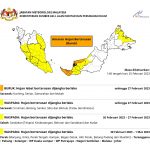Top photo: High Contrast, CC BY 2.0 DE <https://creativecommons.org/licenses/by/2.0/de/deed.en>, via Wikimedia Commons
By Prof Dr Mohd Tajuddin Mohd Rasdi
Today, I’d like to share my response to a talk given by a senior civil servant at my university recently about the effects of climate change on disasters such as floods and landslides that are currently plaguing our cities and town areas.
I am actually not a fan of the view that only climate change is to be charged with the cost of wrecked cars and mountains of damaged furniture, and even lost lives. To me it sounds too simple to absolve politicians and senior civil servants of contributing factors like negligence and incompetence.
When pressed, however, the speaker placed the whole problem on the shoulders of ordinary Malaysians. He called on all Malaysians to study climate change and change our habits. Wow, such a simple and elegant solution!
There are over a million civil servants to spearhead policies to deal with the climate crisis, yet it is still the rakyat that has to be the first and the last in line?
The senior civil servant went on to explain that policy changes require punitive actions and, according to him, that is not the best way to go about doing things as people will not take the need to change behaviours to heart, and there would always be loopholes and “other” ways around policies.
Habits like cycling instead of driving, not wasting water, telecommuting, and choosing a green lifestyle are the surest way to mitigate climate change, he said.
Well, I do agree with him that a fundamental change in how we live is the core answer but I completely disagree with him about policy changes. I think both government policies and citizens’ initiatives are needed to address the issue.
I’d like to suggest three aspects of policy change that would eventually help citizens and our children to learn about our carbon footprints and change our habits to become greener. These three aspects encompass education, urban planning and religious behaviour.
To begin with, education. I feel strongly that the subjects of General Science and Geography should be merged at the secondary school level, in Forms One, Two and Three. These two subjects should be treated as one, with scientific principles, economic principles and the physical geography of the earth connected to issues like pollution and climate change. How long are we supposed to carry on with the same classification of knowledge that segregates life into smaller and smaller unrelated compartments?
The syllabus of the new subject should also include how to make changes to school life habits as well as working to clean up the neighbourhood and village/town. Frequent guest lectures by NGO activists, politicians, academicians and mid-level civil servants should be part and parcel of the syllabus.
Teachers of this subject should be specially trained at workshops with passionate activists and university academicians.
The country’s 400,000 teachers are among the true frontliners in the battle against climate change because they can teach our children why and how we need to adjust our behaviour.
At the university level, the Mata Pelajaran Umum Universiti, or General Studies, subject must include an understanding of climate change, carbon footprints, sustainable economies and a green lifestyle. No two ways about it. No student, whatever his or her discipline, should graduate without understanding what all this means for the planet.
That senior civil servant who gave the talk emphasised many times the need for cycling as a major means of transportation, and the image of the bicycle appeared more times than I can remember in his slides. I was amused when he talked about cycling to the market, to work and to the mosque.
I cycled from Taman Sri Skudai to Universiti Teknologi Malaysia Skudai, Johor, for one year before I could afford a motorcycle. And if you don’t die in an accident (because Malaysian drivers aren’t trained to notice and give way to cyclists), you better pack a towel and another shirt to dry off with and change into before you start your day.
When I visited the city of Toyohashi in Japan, the first thing that struck me was the 2m bicycle lane that ran throughout, complete with safety rails and full of so many bicycles. Students, grandmothers and children cycled easily, safely and without sweating buckets. Our town planners must provide a safe lane with safety rails and shaded by trees or canopies as much as possible if cycling is to be seriously adopted here. No two ways about it: No shaded, safe lane, no cycling.
Finally, there is the ever “sensitive” issue of religion. I once wrote, tongue in cheek, that the more Muslims become religious, the more pollution will increase because they would be travelling to the mosque five times a day. My solution then was to build smaller community mosques that hold several hundred congregants and not large, showy ones that can take 2,000 people. The smaller the congregation, the closer the walking or cycling distance in the neighbourhood to the mosque.
For Friday prayers in larger mosques, car-pooling must be made a religious duty and people reminded frequently in sermons. This would lessen carbon emissions from single-occupant vehicles and also reduce traffic congestion during Friday prayers.
How water is used for the ritual ablutions without wasting it must be addressed in sermons, too. Some mosques have resorted to sensors in taps but a simpler, less expensive and less technology-dependant solution is to use a small bucket. The more buckets-full used the less spiritual reward you get. Simple.
Climate change is not supposed to be an excuse or a get-out-of- jail-free card for senior civil servants and politicians to use to brush off floods and landslides causing distress to the people. Changing our lifestyles is the core solution to the issue of climate change mitigation in the long run but such changes must be led by policy changes in education, urban planning and, yes, even in sermons delivered. The heads of the Malaysian Family must lead the charge in this big battle. No two ways about it.
Prof Dr Mohd Tajuddin Mohd Rasdi is Professor of Architecture at the Tan Sri Omar Centre for Science, Technology and Innovation Policy Studies at UCSI University. The views expressed here are entirely the writer’s own.



